What To Do About North Korea?
North Korea continues to advance its nuclear program but it's unclear what anyone can do about it.
The news yesterday about North Korea’s fifth nuclear test has quickly become an issue in the U.S. Presidential election, but it seems clear that neither major party candidate has any real idea what to do about it, or what to do if North Korea, as it inevitably will, continues down this path toward what could become a real nuclear threat to the region and the world,
Donald Trump, for example, was quick to blame President Obama and Hillary Clinton for the current state of affairs, but his campaign refused to provide any concrete details about what Trump himself might do:
If North Korea had weapons that could reach the United States, Donald Trump will make sure they don’t use them. How exactly? That’s a secret.
Trump campaign manager Kellyanne Conway appeared on CBS This Morning and was asked about the nuclear test that North Korea conducted Friday.
How would a President Trump react if North Korea had nuclear weapons that could make it to the U.S.?
Conway’s short version: “North Korea and the rest of the world would know, Charlie, that President Trump and Vice President Pence aren’t messing around with anybody who is trying to threaten our lives.”
The anchors pressed on. But what would he do to make sure they knew the U.S. wasn’t messing around?
“He’s not going to reveal all of his plans and he’s made that very clear and maybe someone can ask him in a debate. But the fact is that this entire world would be put on notice that there’s a strong leader in the White House,” Conway said. “There would be no failures inSyria, in Libya, in Benghazi. There would be no Russia reset. There would be no advance of ISIS, who our own President called the JV team,” she continued.
But before the nuclear test Tuesday, Trump seemed to have a plan of his own — get China to deal with it.
“What I would do very simply is say, China, this is your baby,” Trump said during a campaign appearance in Virginia Beach, Va. “This is your problem. You solve the problem. China can solve that problem.”
In other words, you’ll have to elect Donald Trump to find out what Donald Trump’s North Korea strategy is, but it may just boil down to hoping the Chinese do something about it.
Hillary Clinton, meanwhile, talked about getting tougher on sanctions:
NEW YORK — Democratic presidential nominee Hillary Clinton suggested Friday that she would adopt a tougher stance against North Korea that could approximate the global ring of sanctions and pressure she credits with drawing Iran to the nuclear negotiating table.
“It’s clear that the increasing threat posed by North Korea requires not only a rethinking of the strategy but an urgent effort to convinced the neighbors, most particularly China, that this is not just a U.S. issue,” Clinton said.
She did not dispute that the current policy of sanctions on North Korea and pressure on its ally and protector China has failed to stop North Korean aggression, including the country’s fifth nuclear test Friday.
“I think we have an opening here that we haven’t had in the last several years that I intend to do everything I can to take advantage of,” Clinton said of the test and the international dismay it caused.
The remarks put Clinton on record seeking a tougher line on North Korea than has been pursued by President Obama, whom she served as secretary of state.
Three presidents, beginning with Bill Clinton, have sought without lasting success to prevent or curb nuclear ambitions by North Korea.
In her remarks, Hillary Clinton pledged help for U.S. allies in the region — principally Japan and South Korea — in the form of U.S. missile defense systems.
“That is not something that North Korea or the Chinese or the Russians in the region are particularly pleased about, but what is the alternative?” she said. “We are not going to let anyone who is a treaty ally or partner of ours be threatened, and we are not going to let North Korea pursue a nuclear weapon with a ballistic-missile capacity to deliver it to the United States’ territory. That is absolutely the bottom line.”
As Clinton herself acknowledged yesterday, though, we’ve followed a strategy of ever-increasing sanctions for twenty years now, and it hasn’t really accomplished anything in terms of deterring the North Koreans from achieving their goal of developing a nuclear arsenal. Even leaving aside the obvious concerns about the sanity and motivations of the current leadership of the country, it is arguably understandable that efforts to deter Pyongyang have failed to accomplish anything notwithstanding the fact that it has essentially successfully cut North Korea off from the world economy. Additionally, other than the aid it receives from China and apparent clandestine ties with the Iranian regime, Pyongyang has few ties left with the rest of the world that can be cut off as further punishment for its behavior. Taking that into account, it’s clear that while the world is outraged at North Korea’s latest provocation, it’s unclear what anyone can do about it:
[T]he sanctions have done nothing to stop the government’s determination to further its quest to develop ballistics missiles with nuclear warheads. Nor is it clear that further sanctions would be a deterrent.
“The current sanctions-only approach, however tough, is simply not working, and continuing on that track is a recipe for even greater failure,” said Daryl Kimball, executive director of the Arms Control Association. “The next president, even before Inauguration Day, will have to have a strategy in place to try to effectively engage with the North to try to leverage the sanctions regime in place to achieve some restraint on North Korea’s nuclear missile activities.”
(…)
So far, nobody has come up with a policy or reaction likely to convince Pyongyang to stop or slow down its nuclear program. Scott Snyder, director of the Program on U.S.-Korea Policy at the Council on Foreign Relations, said the threat is growing as the strategy of patience is proving futile and the potential for confrontation grows.
“The current administration’s policy has been pursued because of the perception that there was still time to turn North Korea around,” he said. “But the closer Kim Jong Un gets to having a direct-strike capability, the greater the pressure will be, presenting a new administration with only two options — acquiescence to North Korea as a nuclear state, and use of military force in order to deprive North Korea of that capability. That’s basically the territory we are entering.”
David Ignatius notes that North Korea could end up being the first big test that the next President faces upon entering office. It’s hard to argue with this conclusion when nuclear weapons experts are estimating that North Korea will have developed warheads small enough to be delivered on missiles that can reach at least part of the continental United States by 2020 and the current advances we know about only seem to confirm that conclusion. The problem is, as I’ve said, it’s unclear exactly what can be done at this point. Additional sanctions are, of course, an option, but the success rate there is hardly something to be impressed with. Unilateral military action by the United States and South Korea, while it likely would ultimately be successful in destroying the Kim Regime, creates the significant risk of collateral damage to the civilian and industrial infrastructure of South Korea, along with the significant casualties that would entail. One option that may have some hope is the current plan to move forward with a missile defense system that would be aimed at protecting South Korea, and potentially Japan, from a North Korean attack. This is an option that the Chinese have long objected to because they fear the impact it could have on their own nuclear weapons capability. Potentially, this could become the basis for a bargain with the Chinese in which they agree to put increased pressure on Pyongyang in return for scaling back the missile defense systems, but this assumes that the Chinese still have sufficient influence over North Korea to have an impact on their behavior. Another idea, which was touched on in the comments to my post yesterday, is the idea of South Korea and Japan developing their own nuclear weapons programs. Both nations are certainly wealthy enough to do so and have the technological know-how to accomplish the task if they really wanted to do it. The problem with this option is the same one that has motivated efforts at limiting nuclear proliferation since the 1950s, namely that the more nations that have nuclear weapons the more likely those weapons will fall into the wrong hands. The final option, of course, is the one noted above, that we acquiesce to the idea of a nuclear armed North Korea and hope that they (1) don’t use the weapons or (2) don’t sell their technology in an effort to stave off the latest famine. Given the manner in which the Kim Regime has acted since the nation’s founding, though, that requires a level of trust to which they arguably aren’t entitled.
So, there you have it. The world’s options when it comes to North Korea are exceedingly limited, and anyone who tells you otherwise doesn’t really know what they’re talking about.
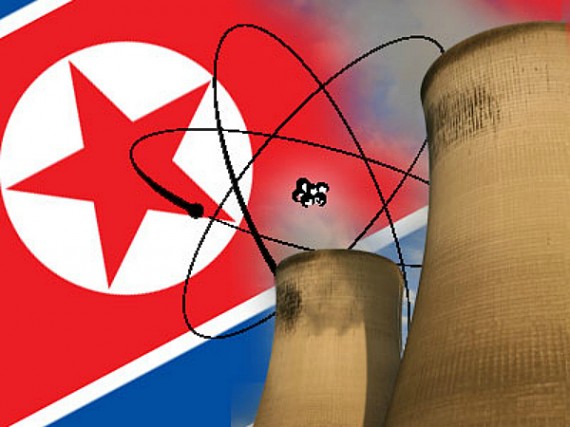

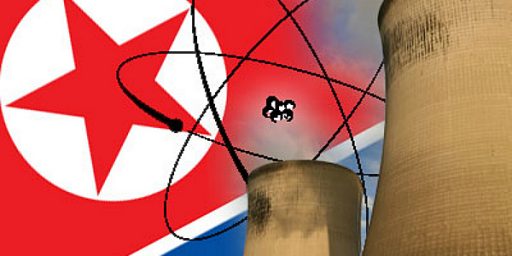
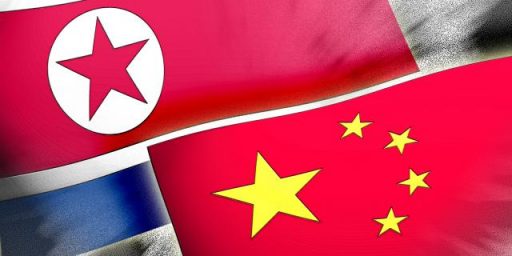
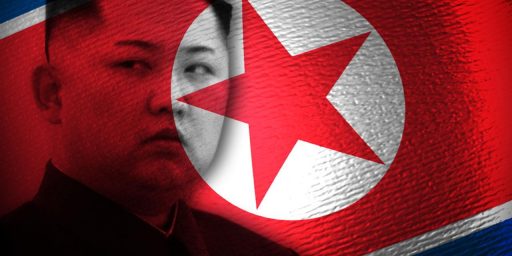
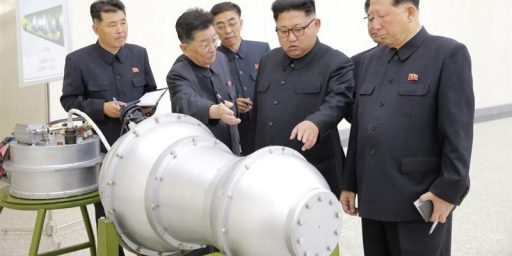
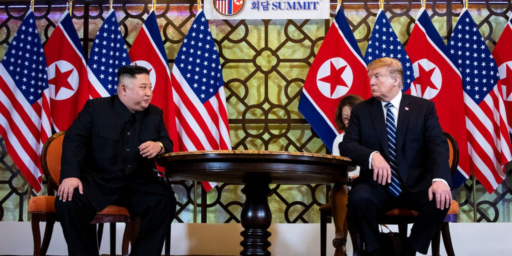
Seoul is about 30 miles from the border to North Korea, if the US would do anything that North Korea would consider a military action, it may just decide to rain hell on the South Korean capital.
But Trump has a secret plan.
I think we should make it absolutely clear to the Chinese that we will not accept a nuclear North Korea with the ability to strike the continental US and if/when we are faced with that, we will use direct military force to destroy that capability, including, if necessary, by removing the Kim regime entirely. The NK regime is simply not stable and rational enough to be allowed to have nukes that can hit US targets.
Ideally, we should also make it clear to China that even the current threat to our allies in the region is unacceptable in the long run, so unless NK halts its nuclear program in the near future, we will do as you suggest, Doug, and significantly scale up missile defense systems in the region as well as encourage and assist Japan and SK in developing and deploying their own nuclear arsenal.
@R. Dave:
Agree with you here. Now Doug, as a non-interventionist-type, doesn’t like such an option and is sure to point out the many obstacles to pursuing such an option. But when you have eliminated any other option, then what remains, no matter how difficult, is the only course left to pursue.
Now it’s possible that if we make this sufficiently clear to China, China might do whatever it takes to forestall this option. If that happens, great. Not sure China can even do anything, though, short of a land invasion of North Korea.
@R. Dave:
How should we make it “clear to the Chinese”? I’m not being snarky; I actually want to know.
The Chinese don’t believe we’re capable of putting any real pressure on them and they’ve already scoffed at the pressure we’ve expressed willingness to apply.
Heck, Chinese military officials believe that China would survive nuclear war with the U. S. What is it that we’d do to make it clear to them?
I alluded to this on the last thread about NoKorea; I personally know almost nothing about that country. I have not heard from anyone who has in depth knowledge of the place. We can’t have a discussion about them without some knowledge. There may be a simple easy solution, or maybe it willing be very costly and take a long time. Right now, I’d be willing to bet that Dennis Rodman has more information on this subject than all except a tiny coterie of specialists. Study first; debate later.
We can not have foreign policy based on informationless gut feelings. I know that we are in the midst of an election where dataless gut feelings predominate; this is not sustainable.
China could put a lot of pressure on North Korea if the Chinese authorities cared to. The North Koreans import 90% of their oil, their single largest import, from China (the other 10% is from Russia).
The Chinese are North Korea’s largest trading partner, responsible for about 70% of North Korea’s foreign trade. Shutting that down would hurt the North Koreans a lot more than it would the Chinese.
And they could close the border which at present is one of North Korea’s few safety valves.
I think very frank diplomacy (i) at the highest levels, (ii) well in advance so it’s not in the midst of a crisis, and (iii) behind closed doors so there are no “saving face” issues to muck things up. I would also try to offer China something it wants that we’ve been reluctant to give up to really demonstrate how important this issue is to us and provide them with a carrot in addition to the stick. Maybe pressure Japan (also behind the scenes) to give up the Senkaku Islands in exchange?
@R. Dave:
Fixed that for ya.
The reason that this situation arose in the first place is because the Chinese regard North Korea as a buffer zone and South Korea has the potential to be utterly destroyed with relative ease, due to the fact that it has a high population in a small area within a short distance of the North Korean border. That is what produced the stalemate of the Korean War sixty years ago and why it has remained that way ever since.
Until the Chinese regard North Korea’s leadership as a threat to China’s security, nothing is going to change. More sanctions are the US’ only answer, even if the value of those sanctions is merely symbolic. There are no easy answers for this one.
I think we have to work out a deal with the Chinese to allow missile defense of South Korea and Japan. A limited screen, perhaps involving Aegis cruisers, would protect them from a rogue missile strike without compromising China’s nuclear arsenal. Other than, we’re just going to have to wait this out. There is no silver bullet here that will solve this problem, no matter what Trump may bluster.
@Pch101: I fully recognize that significant South Korean casualties are highly likely result of any US strike on North Korea. However, I think that becomes an acceptable risk when the alternative is NK having the ability to launch direct nuclear strikes on the US. It’s essentially a hostage situation, and the NK nuclear program is an attempt to increase the number of hostages by adding tens of millions of Americans. They can’t be allowed to do that.
Waiting it out only works in a stalemate situation where neither side is advancing. If they just freeze their program at the current level, then sure, we can wait them out. NK isn’t content with the status quo, though, and is actively expanding their strike range. That’s what I think requires an active response.
@Pch101:
Isn’t this saying that there is in fact NO answer?
There’s a difference between saying there are no easy answers and saying there are NO answers.If you are President , you can’t say there are no answers. You can say a bloody Korean war is the answer and it’s the last resort; you can’t say, “We will never even consider that under any circumstances.”
Now if we can live with a North Korea capable of lobbing nuclear missiles at American cities, then make that case and we can have a different discussion.
@Hal_10000:
And if China doesn’t want to do that?
I’m all for waiting stuff out, but we certainly have to prepare for what will happen if China doesn’t want to play our game.
Can we live with a North Korea with nuclear ICBM capability? Discuss.
@R. Dave:
Well, that’s easy for you to say because you aren’t in South Korea and no one will blame you personally if Seoul is turned into a parking lot.
In any case, engaging in brinkmanship with the Chinese is dangerous policy. To use that approach, it would be better to dispense with the advanced threats and just launch a preemptive strike against North Korea with the goal of wiping out the government and military before it can react, then tell the Chinese once the first blows have been landed that we want them to continue to use North Korea as their buffer zone and that we want them to be in charge of the long-term occupation. Once the attack has been launched, it could be spun as a joint US-Chinese security operation so that the Chinese can save face and have no fear of Korean reunification, and one would hope that this war would not kill too many South Koreans.
The other aggressive alternative is to link Sino-US trade with what happens in North Korea. Essentially turn the North Korean political problem into a Chinese economic issue. That is also not free of risk for obvious reasons.
There are tons of alternatives, it’s just that they all suck:
1) We could launch a pre-emptive nuclear attack on NK nuclear facilities along with a decapitation strike, and leave the SK’s and China to clean up the mess.
2) We could launch a conventional attack on NK facilities and a decapitation strike and again, leave SK and China to clean up the mess.
3) We could play superpower tit-for-tat with the Chinese. You don’t want to deal with NK? Fine, we’ll park the Seventh Fleet right in the middle of your little fake islands, sell more subs and jets to Taiwan, back a Burmese insurgency (surely there’s someone ready to insurge in Burma) and shut down China’s projects there. We could turn the CIA loose against Chinese projects in Africa. Etc…, etc…
4) We could erect anti-missile defenses. If China doesn’t like it, they know what they can do.
5) We could tell Liam Neeson his daughter’s been kidnapped by Kim Jong Un.
6) We could sit and wait.
Don’t bother telling me the problems with these scenarios, I already know.
@stonetools:
It’s an exercise in can kicking. There are times when stalling is the only option, as bad as that may be.
At this point, I would see a preemptive attack as the only viable alternative that is even slightly realistic, and that would obviously be an enormous risk. And I presume that such an attack would take resources away from the anti-ISIS bombing campaign, so there are other policy consequences aside from those in Asia.
@Pch101:
Of course, North Korea could launch a conventional assault on South Korea,behind its nuclear missile shield too. South Korea wants to stop North Korea even more than the US, and I expect that if the US takes any action , it will be with the cooperation of South Korea. One thing is certain: if North Korea gets nuclear ICBM capability, South Korea and Japan will want to acquire such capability too, which leads again to the question:
To say that preventing it is hard is not an answer to the question.
PS. Just saw your answer.
We could use economic sanctions against the Chinese, rather than the North Koreans — it would likely cause a backlash, and hurt both our economies, and I’m not sure the Chinese would care more about the hurt to their economy than hurting our economy. But, it’s an option.
The Chinese might be hoping to trade North Korea for their expansion across the shipping lanes further south (blanking on the name). I don’t like it, and I don’t want to reward the Chinese for using North Korea this way. But, it’s an option.
Shooting down the North Korean missile tests is an option. Probably a very bad option, but it’s not going to create an arms race and long term problems, just short term problems.
@Pch101: It’s worth pointing out that we don’t need to do anything immediately — the North Koreans are being deliberately provocative, but we don’t have to be provoked.
During the long run up to the Second Iraq war, there were a number of points where we could have negotiated with Saddam Hussein, but chose not to. He was willing to allow much greater access to UN inspectors, etc. We believed that he was planning on then stop complying as soon as the pressure so we didn’t actually negotiate.
If we were to decide that a preemptive strike against North Korea was our only option, there would still be a choice of whether we go in with a small, lightning fast strike to take out the leadership and nuclear facilities, or a larger force to take and hold the country.
Building up to the larger strike would give the Chinese time to realize that a major war on their doorstep is not in their best interests, and support/implement a coup.
If the Chinese are presented with the following options:
– major war on the border, refugee crisis and lose North Korea as a buffer
– direct war in North Korea with the US
– implement a coup against Kim, keep North Korea.
That third option looks pretty good.
It does mean that we would have to be willing to go with either of the first two options if the Chinese don’t act, though, which is a pretty big gamble.
@PJ: North Korea won’t need a nuke to level Seoul as they have a large amount of artillery already in position to do so.
@michael reynolds:
Shitty options all. If we really want to deal with the threat, a preemptive nuclear strike is probably the way to do it.
Does not sound terribly viable to me.
Here’s an old CF article which IMO has it about right. Bottom line of their puny nuke program is that it’s about domestic economics. There is a lot of logic to support this, they even fairly frankly stated the intent during the 2013 plenary meeting of the Party.
http://blogs.cfr.org/asia/2013/11/20/the-motivations-behind-north-koreas-pursuit-of-simultaneous-economic-and-nuclear-development/
They need to transition away from their silly million man army economy. Tricky to do when the people are fully indoctrinated to believe that is the only thing standing between them and instant annihilation, and the vested interests in that economy are probably willing to stage a coup to continue it. There isn’t much of a middle class there, and the army leadership knows full well how bad it is to become a peasant in that place. Nevertheless they are aware they will not be able to be the sole source of information to their people for much longer. The generals are old and probably seeking to keep the existing system until they run out their personal clocks.
The plan IMO is to convince their people that they have an invincible nuclear shield to lessen the ability of the army generals to get public support for a coup. They view this as an imperative, and thus have even alienated the Chinese on the issue. They are not simply a Chinese puppet state, as many believe, that much is now abundantly clear, and if the Chinese can’t talk them out of it it is highly likely nobody can.
The only option is probably war, a war based on the assumption that the PDRK is either hell-bent on committing national suicide or convinced they can dominate the world with a few nukes. Reminds of Cheney’s idiotic “1% doctrine”, it does….
@Gustopher:
And if this strike does not achieve its goals? Seoul and possibly Tokyo being destroyed might be the consequence of failure.
@Matt:
That was what I was referring to, hence the comment about the 30 miles.
How soon before Senate Republicans tell North Korea not to bother even talking to Hillary? Does Tom Cotton have a draft already?
@anjin-san: yes.
I don’t think there is a military solution that doesn’t see shelling of Seoul. Before considering a military solution, we need to be ready to bomb the artillery positions, and accept substantial civilian death.
That said, do we trust North Korea with nuclear weapons? Do we trust them to have effective command and control? Do we trust them not to sell nuclear weapons or materials? I don’t. They’ve done everything they can to demonstrate that they are not rational actors.
We don’t have to act immediately, but this is a problem that is going to get worse rather than better if we do nothing. And we shouldn’t take options off the table — even while pursuing other options.
I would much rather China act than leave us to act — even if the consequence is that North Korea becomes a Chinese province (not that they necessarily want a province full of backwards, starving citizens). Alternately, the Chinese could move in to “protect” the North Korean nuclear program — I would trust the Chinese to maintain control of the weapons.
One person I would not trust making these decisions is Donald Trump. Poor temperament, and poor judgement.
Our response will require us to coordinate with our allies, and hopefully even ally with our enemies where we have common ground. When the sum total of “The Art of the Deal” is to not pay your bills, that doesn’t prepare you to actually make deals.
I think Clinton was a thoroughly mediocre Secretary of State, but I have confidence in her ability to muddle through.
Trump will get hung up and belligerent about no red carpeted stairs, or roll over to get his belly rubbed if the red carpet is plush.
@R. Dave:
You are saying that we should allow our ally to suffer millions of civilian casualties and the destruction of their capital, to make sure that NK only has the ability to attack them, not us.
Do I have that right?
Defending America to the last dead South Korean. Charming really.
@Gustopher:
The US isn’t in a position to instruct the Chinese to support a North Korean coup before the fact. The Korean War and its aftermath should make it obvious that we can’t simply dictate terms to China, and China can be expected to rebuff any US efforts to directly interfere with North Korea and to use any such efforts against us. (If anything, China would leak the news and use it as a pretense for it to build stronger ties with the Pyongyang government.)
It might be possible to do this with China after the fact if the policy is already a fait accompli and we’re asking for forgiveness rather than permission. But we aren’t going to get permission for a preemptive strike in advance, and it’s certainly a high-risk maneuver that could produce considerable casualties in South Korea. It’s not the sort of policy that anyone in the west is going to want to own if the repercussions are high.
@Lounsbury:
I do love being on the receiving end of moral condescension from Brits. It’s all so clear once the empire is gone, eh?
70 years without a major war, an unprecedented period of peace, brought to you by the taxpayers, soldiers and politicians of the United States of America. But to our European betters we’re never anything but boobs and rustics.
Europeans lost the right to lord it over us when they failed to manage the break-up of Yugoslavia and the subsequent ethno/religious wars. Brits, French, Italians, Germans, they could have reached Bosnia and Kosovo by taxi, but no, that would be asking too much. So peace in Europe was restored by boys flying 10,000 miles from Nebraska.
In a word, yes, because the only way you get to millions of civilian casualties is if the NKs use their nukes against SK, and if they’re willing to do that, you’re damn right I don’t want them to have the ability to use them against us. But bear in mind that the only reason they have the ability to kill millions of SK civilians now is because when people recommended drawing a line in the sand ten years ago and twenty years ago, others responded with exactly the same question you’re asking now, just with a casualty count in the tens or hundreds of thousands because it would have been a purely conventional attack at that time. NK just keeps increasing the number of “hostages” it has as the years tick by. We are in this situation precisely because of thinking like yours.
@R. Dave:
Which part of “Seoul is only 30 miles from the border” did you not understand? Do you have any idea what the range of conventional artillery, rocket, and missile systems is? Or what the population of Seoul is?
NK does not need nukes to wipe out Seoul and Incheon, combined population about 13 million.
None of which is really relevant to the point that you are saying that our ally should commit virtual suicide in order to protect the US — not from harm, but from the threat of harm. Why would they do that? Why would we want them to do that?
@R. Dave:
You need to learn the history of the Korean War. Short recap:
-North invades South, takes most of South territory
-US/UN forces drive the North back past the 38th parallel and almost reaches the Chinese border
-China enters war for North, drives US/UN forces back until ultimately forcing a stalemate
Lessons:
-South Korea is vulnerable if attacked
-China poses a formidable threat if it enters a hot war
Western leaders are not just a bunch of idiots who don’t know better. Rather, history has made clear that another war would inflict enormous casualties on the South while failing to fix the underlying threat to the west that is associated with Chinese involvement. The underlying problem here is not North Korea per se but that China has North Korea’s back and regards it as a buffer zone — it is not possible to have a hot war with North Korea without considering the Chinese position.
It is one thing to debate strategies all night, and it is another to make a cool assessment of the capabilities of our current armed forces, which have been seriously weakened during this administration. To build the forces up we would probably have to start up selective service once more, and open up production lines for war material of all sorts, looking at a long war.
This would be political death to propose without far better reasons to go to war with NK (and probably China) over their mad threat of nuclear war, or holding major cities hostage to attack. Among the serious constraints we would have is our financial inability to afford anything like a protracted war at this time.
Air war only versus the NK is not a viable option for a number of reasons, but our remaining bomber fleet could wreck havoc on the enormous NK forces and weapons in place in the corridor down to Seoul. In fact there has been thinking along those lines for years in the AF, making use of our smart standoff weapons, until we could reinforce the defenses of the SK. This might stop the NK from invasion, but Seoul would be rubble.
If the NK was in serious trouble, my assumption is that China would once again come to the rescue, and we had that war before, but this time it is with the backdrop and threat of China (and NK) having nuclear weapons and the means to deliver them to the US Japan, Etc. The thought of trading major cities on both sides in a flash does not appeal to me.
My conclusion is that we should augment our armed forces substantially over the next three or four years as an insurance policy against being forced into a war or wars. Perhaps then we could look into workable plans for staring down the NK Meanwhile, we have a lot of fixing up to do here in the US. Keep our powder dry, for now.